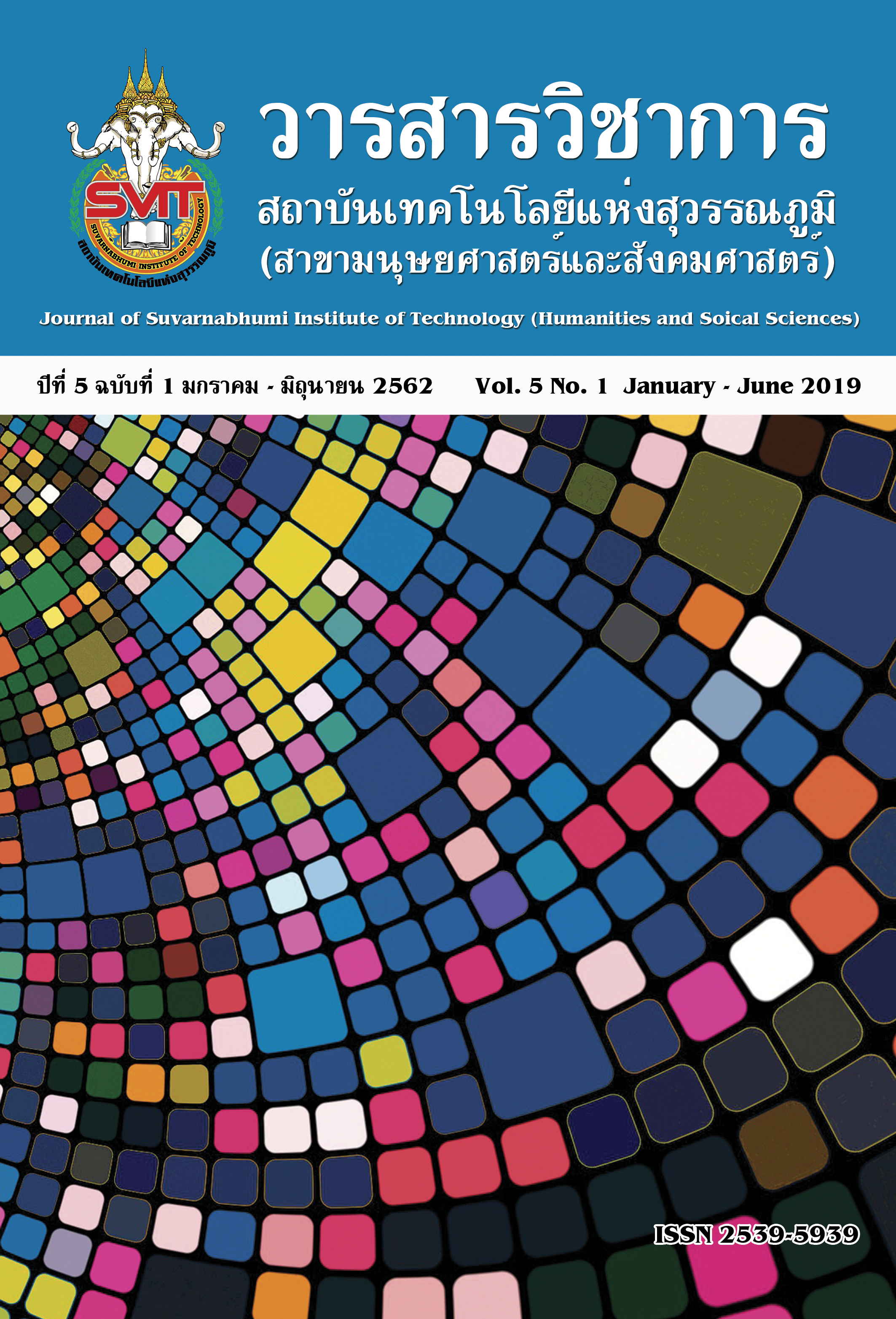GUIDELINES FOR DEVELOPMENT OF WORKFORCE IN MANUFACTURING INDUSTRIES IN SUPPORT OF “THAILAND 4.0” POLICIES
Keywords:
Antecedents;, Influence Development of Workforce, Manufacturing; Industries;, Thailand 4.0” PoliciesAbstract
This research is a mixed method research, both quantitative and qualitative. Guidelines for development of workforce in manufacturing industries in support of “Thailand 4.0” policies applied mixed method research to study the relationship between antecedents of demography, antecedents of human resource management of manufacturing industries, antecedents of private and public vocational education management, and their effects on development of workforce in manufacturing industries in support of “Thailand 4.0” policies. The objectives of the research were also to study the influences of the antecedents of demography, antecedents of human resource management of manufacturing industries, and antecedents of private and public vocational education management that affected the development of workforce in manufacturing industries in support of “Thailand 4.0” policies. The sample population is employees of the manufacturing industry located in Lat Krabang Industrial Estate in Bangkok amount 420 people
The results were that antecedents of demography, antecedents of human resource management of manufacturing industries, and antecedents of private and public vocational education management were correlated with the development of workforce in manufacturing industries in support of “Thailand 4.0” policies. Most of the variables were directly related with a correlation coefficient of 0.107 to 0.787. The result were statistically significant out the 0.05 and 0.01 levels. In the structural equation modeling analysis, the goodness of fit index was found that Chi-Square (x2) was 64.43, degree of freedom was 52, p-value was0.116, and x2/df was 1.239. As the value was less than 2.00, there was a consistency between the model and the empirical data. Thus, it was concluded that the three antecedents had an influence on guideline for development of workforce in manufacturing industries in support of “Thailand 4.0” policies.
References
กระทรวงแรงงาน. (2559). [ออนไลน์]. กรอบยุทธศาสตร์การพัฒนาทรัพยากรมนุษย์ของประเทศ ระยะ20ปี (พ.ศ.2560-2579). [สืบค้นวันที่ 18 มิถุนายน 2560]. จาก https://doe.go.th/Imia
การนิคมอุตสาหกรรมแห่งประเทศไทย. (2560). ข้อมูลผู้ประกอบการและผู้ใช้แรงงานในเขตนิคมอุตสาหกรรมลาดกระบัง ณ เดือนตุลาคม 2560.
กฤษฎา ตันเปาว์, วิลาวรรณ หอยสังข์ และ ศราวุธ อ่องลา. (2559). การศึกษาสภาพปัญหาการบริหารทรัพยากรมนุษย์ในนิคมอุตสาหกรรมอมตะซิตี้ ระยอง. เอกสารการประชุมวิชาการระดับชาติสหวิทยาการเอเชียอาคเนย์ 2559 ครั้งที่ 3.
ชูชัย สมิทธิไกร. (2556). การสรรหา การคัดเลือกและการประเมินผลการปฏิบัติงานของบุคลากร. กรุงเทพฯ: สำนักพิมพ์แห่งจุฬาลงกรณ์มหาวิทยาลัย.
ตรีเนตร ตันตระกูล. (2561). การพัฒนาทรัพยากรบุคคลในสานักงานเขตประเวศ กรุงเทพมหานคร. วารสารวิชาการสถาบันเทคโนโลยีแห่งสุวรรณภูมิ.
ธานินทร์ ศิลป์จารุ. (2554). การวิจัยและวิเคราะห์ข้อมูลทางสถิติด้วย SPSS และ AMOS. พิมพ์ครั้งที่ 13. นนทบุรี: เอส อาร์ พริ้นติ้ง แมสโปรดักส์ จำกัด.
พิริยะ ผลพิรุฬห์. (2557). โครงการวิจัยเรื่อง การพัฒนาระบบการศึกษาอาชีพและการเรียนรู้นอกระบบเพื่อสร้างระบบการเรียนรู้ตลอดชีวิตของประเทศไทย. โครงการวิจัยคณะพัฒนาการเศรษฐกิจ สถาบันบัณฑิตพัฒนบริหารศาสตร์และวิทยาลัยนานาชาติ สถาบันบัณฑิตพัฒนบริหารศาสตร์.
วาสนา ศรีอัครลาภ. (2559). การบริหารทรัพยากรมนุษย์ในองค์การแห่งยุคสารสนเทศ สู่องค์การยุคใหม่ในอนาคต. ปรัชญาดุษฎีบัณฑิต สาขาวิชาการจัดการ คณะวิทยาการจัดการ มหาวิทยาลัยศิลปากร.
สำนักงานคณะกรรมการการอาชีวศึกษา กระทรวงศึกษาธิการ. (2560). ภารกิจและนโยบาย สํานักงานคณะกรรมการการอาชีวศึกษา. [สืบค้นวันที่ 12 ตุลาคม 2560]. จากwww.oic.go.th/FILEWEB/CABINFOCENTER4/DRAWER023/.../00000020.PDF
สำนักงานพัฒนาเศรษฐกิจและสังคมแห่งชาติ. (2559). แผนพัฒนาเศรษฐกิจและสังคมแห่งชาติ ฉบับที่ 12 (พ.ศ.2560-2564). สืบค้นเมื่อ 19 มิถุนายน 2560, จาก https://www.nesdb.go.th/download/plan12.pdf
Cronbach, L. J. (1970). Essentials of Psychological Testing. 3rded., New York: Harper and Row.
Tamar, Manuelyan Atinc. (2011). Skills and Education to Support Innovation and Productivities in East Asian Investing in the Future, Creating New Value. Conference on East Asian Development. Singapore: Orchard Hotel.
World Bank. (2011). Learning for All Investing in People’s Knowledge and Skills to Promote Development. Cited 2017 October 15,. Available from : URL : https://documents.worldbank.org/ curated/en/685531468337836407/pdf/
644870WP0Learn00Box0361538B0PUBLIC0.pdf
Downloads
Published
Issue
Section
License
The articles published are copyrighted by the Sarasas Journal of Humanities and Social Science. The opinions expressed in each article in this academic journal are those of the individual authors and do not reflect the views of Sarasas Suvarnabhumi Institute of Technology. The authors are solely responsible for all aspects of their respective articles. Any errors or inaccuracies in the articles are the sole responsibility of the authors.



